| |
Water Quality Testing: Agricultural Water | |
| |
|
|
| |
|
|
| |

What tests should I have done for agricultural purposes? | Irrigation | Livestock | Spray Water
What tests should I have done for agricultural purposes?
Water quality is important for many agricultural uses such as livestock watering, irrigation, and spraying. Reference materials, including manuals and booklets, along with federal/provincial water quality guidelines can provide information on the type of water quality required for specific agricultural uses.
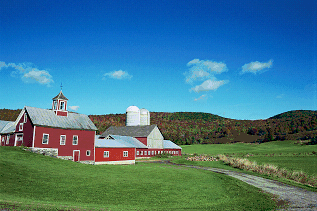
Water quality guidelines provide a list of important water quality parameters with their associated tolerance levels for specific uses.
Many of the commercial laboratories offer test packages that are tailored to a particular agricultural application such as irrigation or livestock suitability. These types of packages can be convenient in ordering tests suitable for your particular water uses.
Irrigation
Basic Irrigation Suitability
Basic Irrigation suitability packages include tests for:
. |
- pH
- Electric Conductivity
- Calcium
- Nitrate-N
- Nitrite-N
- Magnesium
- Sodium
- Potassium
- Chloride
- Sulphate
- Total Dissolved Solids (TDS)
- Hardness
- Bicarbonate
| 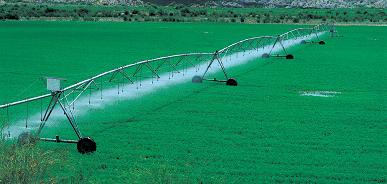 |
The Sodium Adsorption Ratio (SAR) is often provided with the irrigation suitability results. This is a value that is
calculated using the sodium, calcium, and magnesium levels in the water.
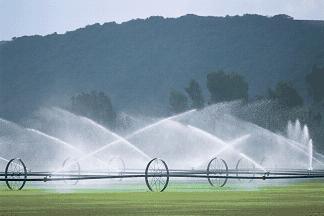
Although a basic irrigation suitability package provides the primary water quality parameters of importance, a customized advanced suitability package can be required depending on the crop type or specific on-site considerations.
Advanced Irrigation Suitability
Advanced Irrigation suitability packages include additional water quality and soil tests required for specific on-site conditions. For instance information regarding the soil texture and chemistry, crop type, and method of irrigation (i.e. drip irrigation vs. sprinkler) all can impact the suitability of a given water source.
Advanced Irrigation suitability packages include tests for:
- pH
- Calcium
- Nitrate-N
- Nitrite-N
- Magnesium
- Sodium
- Potassium
- Chloride
- Sulphate
- Hardness
- Bicarbonate
- Electric Conductivity
- Total Dissolved Solids (TDS)
- Sodium Adsorption Ratio(SAR)
As well as such additional parameters as:
- Aluminum
- Arsenic
- Boron
- Cadmium
- Chromium
- Chromium III
- Chromium VI
- Copper
- Cobalt
- Iron
- Lead
- Lithium
- Manganese
- Molybdenum
- Nickel
- Selenium
- Uranium
- Vanadium
- Zinc
- Fecal coliforms
The additional parameters selected for testing will be based on specific on-site conditions.
Much specific crop and irrigation literature can be found through the federal and provincial departments of agriculture as well as many industry and producer associations and organizations. Please contact a crop or irrigation specialist for specific information regarding advanced irrigation suitability of a given water source.
Livestock
Basic Livestock Suitability
Basic Livestock suitability packages include tests for: | 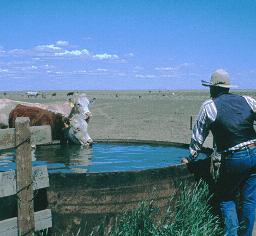 |
- pH
- Calcium
- Magnesium
- Sodium
- Potassium
- Chloride
- Sulphate
- Iron
- Nitrate
- Electric Conductivity
- Total Dissolved Solids (TDS)
- Hardness
|
Although a basic livestock suitability package provides the primary water quality parameters of importance, a customized advanced suitability package can be required depending on the livestock type or specific on-site considerations.
The interaction between the quality of both the feed and water should be considered in maximizing livestock productivity and health.
Advanced Livestock Suitability
Although many of the same water quality parameters are used to assess the suitability of a given water supply for various types of livestock specific on-site considerations are often required. Examples of this are information regarding the type and breed of livestock, age, local environmental site conditions and quality of the feed that need to be considered to assess the suitability of livestock water.
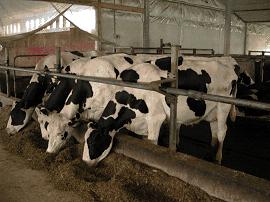
The intake of nutrients and minerals from both the water and feed source require evaluation to ensure livestock are receiving appropriate levels of these parameters.
Additional parameters that can be assessed for livestock water use include:
- Alkalinity
- Fluoride
- Total coliforms
- Faecal coliforms
- Sulfate reducing bacteria (SRB)
- Iron reducing bacteria (IRB)
- Sulfide as hydrogen sulfide
- Cyanobacteria (commonly called Blue-green algae) toxins
Much livestock watering literature can be found through the federal and provincial departments of agriculture as well as many industry and producer associations and organizations.
Please contact a livestock specialist or water specialist for specific information regarding advanced livestock suitability of a given water source.
Spray Water
Basic Spray Water Suitability
The water quality of spray mix water can significantly reduce the performance of some types of herbicides. Spray water quality information can be found through the federal and provincial departments of agriculture as well as many industry and producer associations and organizations. Chemical companies can often provide information and advice regarding the mix water as well.
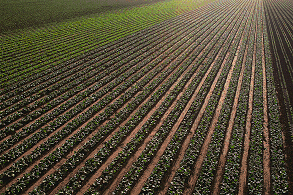
| Spray Water suitability packages include tests for: | 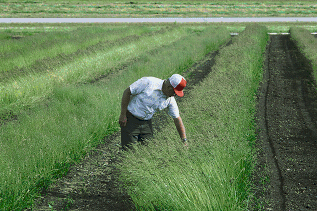 |
- pH
- Electric Conductivity
- Calcium
- Magnesium
- Hardness
- Bicarbonate
- Alkalinity
|
|
|
| |
|
|
| |
Other Documents in the Series |
|
| |
Water Quality Testing
Water Quality Testing: Agricultural Water - Current Document
Water Quality Testing: Drinking Water
Water Quality Testing: How Do I Go About Getting My Water Tested?
Water Quality Testing: What Do the Test Results Mean?
Water Quality Testing: Common Water Quality Terms/Parameters
Water Sampling
Water Sampling: Methods Based on Source
Water Sampling: Field Equipment and Techniques
Water Sampling: Shipping of Samples
|
|
| |
|
|
| |
For more information about the content of this document, contact Shawn Elgert.
This information published to the web on November 15, 2006.
Last Reviewed/Revised on January 5, 2018.
|
|